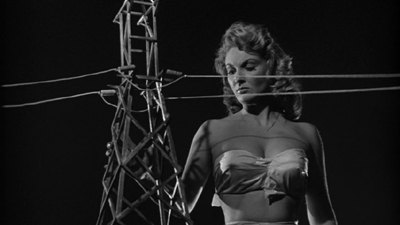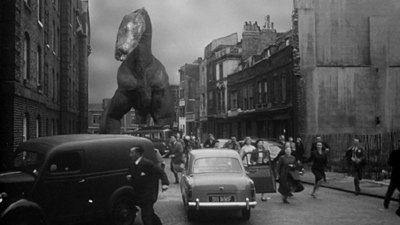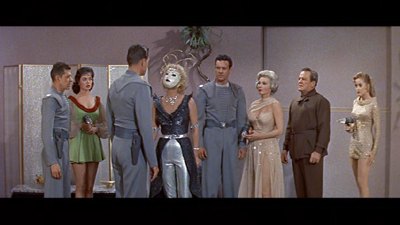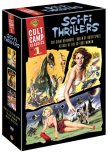| Reviews & Columns |
|
Reviews DVD TV on DVD Blu-ray 4K UHD International DVDs In Theaters Reviews by Studio Video Games Features Collector Series DVDs Easter Egg Database Interviews DVD Talk Radio Feature Articles Columns Anime Talk DVD Savant Horror DVDs The M.O.D. Squad Art House HD Talk Silent DVD
|
DVD Talk Forum |
|
|
| Resources |
|
DVD Price Search Customer Service #'s RCE Info Links |
|
Columns
|
|
|
Cult Camp Classics 1 - Sci-Fi Thrillers
Warner Bros. // Unrated // June 26, 2007
List Price: $29.98 [Buy now and save at Amazon]
Warner Bros. has launched their awkwardly titled "Cult Camp Classics" line, a random assortment of B pictures and genre favorites that are somehow only now arriving on DVD, with four box sets divided by theme. "Vol. 1: Sci-Fi Thrillers" collects three efforts from Allied Artists: "Attack of the 50 Foot Woman," "The Giant Behemoth," and "Queen of Outer Space." As with all the box sets in this series, the titles are also available separately.
 "Attack of the 50 Foot Woman" (1958)
"Attack of the 50 Foot Woman" (1958)
"She will tear up the whole town until she finds Harry."
"And then she'll tear up Harry!"
One of the most widely recognized of all bad movies (thanks to its perfect title and perfect poster), "Attack of the 50 Foot Woman" is at once a riotously awful sci-fi failure and a deliriously sexy pulp success. It mixes a generic size-shifting story liberally borrowed from such works as "The Amazing Colossal Man" and, in reverse, "The Incredible Shrinking Man" with sleazy soap opera melodrama; the combination makes the film trashy in a way that will either delight or appall, depending on your point of view.
One thing's for certain: the movie's a complete mess. This is never more true than in its special effects sequences, in which the titular giant becomes, via sloppy matte work, translucent. Combine this with a crude papier-mâché giant hand, dialogue that centers on the faultiest of science, and a lopsided story that gives too much attention to the first act and too little to the vital third, and you've got a movie that opens its doors wide to the audience in an invitation to mockery.
And yet it's all hypnotic in its peculiar pacing and oddball characters. Screenwriter Mark Hanna (who previously helped pen "The Amazing Colossal Man"), struggling to avoid writing anything expensive, fills the time instead with more domestic matters, the lurid tale of Nancy Fowler Archer, neglected housewife. Played with campy glee by Allison Hayes, Nancy is wealthy, manic depressive, and drunk. She longs for the affections of husband Harry (William Hudson), but he's busy openly cavorting with that floozy Honey Parker (Yvette Vickers, at her most Yvette Vickers-y). Had the aliens and radiation and whatnot never shown up, this could've turned out to be one of your gaudier noirs: at one point, Honey slyly convinces Harry to do away with the missus, but could he do such a thing without getting caught?
In an ordinary story, sure, he might get away with it, but here, there are doctors and nurses and sheriffs all around, for Nancy's earlier ramblings of seeing a giant in the desert weren't drunken tirades at all, but a nutty reality. As we knew from the title, Nancy's been zapped with some space-whatever, and now she's becoming a giantess herself. (She never does quite reach fifty feet, if the effects shots' perspective is to be believed, but does it really matter?)
And even then, we spend more time with, say, the dopey deputy than we do with the title character herself. Once you see the effects, you'll understand why. The same limited footage is reused ad nauseam, while fuzzy composite shots range from poor to unusable. It's easy to see why Hanna and director Nathan Juran (here working under the pseudonym "Nathan Hertz") were eager to stick with the kooky side characters and spend only as little time as necessary with the actual 50 Foot Woman.
You could say the uneven tone lends "Attack" a dreamlike quality, and you could say that Nancy (whose growth and subsequent rage-fueled destruction of a town stems entirely from efforts to attack her philandering husband) is a sci-fi metaphor for feminist empowerment and female revenge fantasy, but both, I fear, would be giving the picture too much credit. It's just a cheapjack quickie, slapped together to take advantage of a popular genre trend.
Of course, just because it's bad doesn't mean it's no fun, and the filmmakers and cast recognize this. The main players all seem to be winking at us through it all, as if to whisper, "ain't this is gas?" It sure is.
 "The Giant Behemoth" (1959)
"The Giant Behemoth" (1959)
"The Biggest Thing Since Creation!"
An odd but welcome entry for this set, as its tone is far more serious than the "Cult Camp" label implies, Eugène Lourié's "The Giant Behemoth" is often viewed as little more than a minor retread of the director's earlier, highly influential radioactive-dinosaur-on-the-loose picture "The Best from 20,000 Fathoms." And in a way it is; it's a by-the-numbers affair plot-wise (with many story points copied in full), the characters are less than memorable, and, aside from a few key sequences, the effects aren't as impressive this time around.
And yet "Behemoth" (aka "Behemoth, the Sea Monster") is, if not a great film, then a solid one, clever and smart in the right places. True to its nature as a British genre effort, it intends to be more cerebral. The story is more a straight-up procedural than a thriller, and once the monster arrives, it does more damage by accident than by brute force, burning hapless citizens with its radiation.
This last point is a leftover from the screenplay's original concept. Writers Robert Abel and Alan J. Adler had proposed a more abstract monster, something of a formless whatzit that kills by emitting the deadliest radiation. The producers were eager for something a little more sensational, and so the script was quickly retooled to feature instead a dinosaur that crawls from the ocean depths and eventually makes its way to the heart of London.
The final script follows the usual formula: a few mysterious happenings, an investigation by respectable scientists (including Gene Evans as the American added for Stateside box office appeal), a close call or two with the beast, some more scientist goings-on, and, finally, the rampage. The science stuff holds its own rather well, maintaining interest despite a slow-going approach. Curiously, the story ignores any efforts at more personal interests - there's no love story, and we don't get much about the lives of anyone involved (even the villagers who first encounter the beast, and who could have added a human touch).
"Behemoth" would be one of the last films to feature effects work by stop-motion legend Willis O'Brien, who served here in a more supervisory position. Most of the more impressive effects are credited to Pete Peterson, who makes the beast's stumble through the city a rousing spectacle, the sort of monster fun fans love. Unfortunately, the impact of these shots is diluted with many shots being reused, while others fail to match in quality. (One early reveal of the beast is laughably fakey.)
Even then, though, the film thrills. It may be a lesser giant-monster flick, but it's still a blast.
 "Queen of Outer Space" (1958)
"Queen of Outer Space" (1958)
"Perhaps this is a civilization that exists without sex."
"You call that civilization?"
Now this is camp. "Queen of Outer Space" is a delirious entry in the all-dame-society genre. The line between intentional and unintentional humor remains forever blurred in this exquisitely insipid tale of a group of space explorers who crash on Venus (where else?) and discover a planet inhabited entirely by females. Strangely enough, the whole mess was scripted by legendary genre writer Charles Beaumont, from a story by playwright/two-time Oscar winner Ben Hecht.
Bold color cinematography displayed in a gorgeous CinemaScope frame helps hide the fact that the movie was made entirely on the cheap: sets and costumes are recycled from both "World Without End" (on which director Edward Bernds had recently worked) and "Forbidden Planet" (the men's costumes must've still reeked of Leslie Nielson), while the story itself is copied from "Abbott and Costello Go To Mars." (Check out the footnotes of DVD Savant's review of this box set for an interesting anecdote about Beaumont's work on both films.) The rest is shoddy storytelling that exists merely for Eisenhower-era T&A.
But, be it by total accident or by the cunning work of a screenwriter slipping in more jokes than the director can identity, the whole thing's just so damn bizarre that we can't turn away, laughing at every frame. When the astronauts arrive on Venus, they wonder aloud if they'll find any form of life, all while standing in the middle of a jungle; I suppose all that alien vegetation doesn't count. Later, we meet the Venusian queen (Laurie Mitchell), who was hideously disfigured by radiation (yet, of course, only her face was affected - check out those Venusian gams!); the scene where she removes her mask in front of the American captain (Eric Fleming) is a hoot.
And the sexism. Oh, the sexism! Surely Beaumont couldn't have been serious when he wrote such exchanges as this one, in which the astronauts discuss the aliens' ray guns:
"How could a bunch of women invent a gizmo like that?"
"And if they did, how could they even aim it? You know what women drivers are like!"
The movie then has the other men shake their heads in collective disgust, but you kinda get the feeling that this is how the movie really feels. After all, that Venusian society just can't hold together without a good man in charge.
The capper is Zsa Zsa Gabor, who pops in as Talleah, leader of a revolutionary group of sorts, one that insists their community is lost without the leadership of men. Zsa Zsa and her cohorts coo and swoon over the males (males who are, by the way, the sort of character actor types who would have to go to an all-female planet to be considered remotely attractive), all while trying to run around in miniskirts and high heels, poorly aiming those ray guns along the way.
It's everything "camp" is meant to be, really, over-the-top in a blindingly goofy you-can't-be-serious manner. It's 50s sci-fi at its doltish worst - and idiotic best.
The DVD
Video & Audio
The three films have been cleaned up quite nicely for their presentations here. All get lush anamorphic widescreen transfers ("Attack" and "Behemoth" are 1.85:1; "Queen" is a stunning 2.35:1). "Attack" looks surprisingly solid for an on-the-cheap production. "Behemoth" shows some unavoidable print damage at times, but it otherwise equally crisp throughout. "Queen" is fairly grainy, while the film's color gaudy scheme comes across quite well.
The original mono soundtracks are used for all three movies (via Dolby); no modern remixing or surround sound tweaking is necessary. There are no flaws at all with any of the audio tracks. No subtitles are included, although all three discs are closed captioned.
Extras
Each film gets its own commentary track. Film historian Tom Weaver leads Yvette Vickers and Laurie Mitchell through "Attack" and "Queen" (respectively), and both of these conversations combine interesting trivia with joyful nostalgia, both actresses having much fun revisiting such admittedly silly works. For "Behemoth," we get special effects vets Dennis Muren and Phil Tippett, who offer second-hand behind-the-scenes tales in between the occasional rough critique of the film itself. On all tracks, there are a few too many lulls in the conversations, but when they're on, they're all very enjoyable.
"Behemoth" and "Queen" also includes their respective original trailers. "Attack" is labeled as offering a trailer, but sadly, none is included.
Final Thoughts
With solid transfers and wonderful commentaries on a budget, Warners' "Cult Camp" line is a gift to B-movie fanatics, and this inaugural set is the perfect launch. Highly Recommended.
 "Attack of the 50 Foot Woman" (1958)
"Attack of the 50 Foot Woman" (1958)"She will tear up the whole town until she finds Harry."
"And then she'll tear up Harry!"
One of the most widely recognized of all bad movies (thanks to its perfect title and perfect poster), "Attack of the 50 Foot Woman" is at once a riotously awful sci-fi failure and a deliriously sexy pulp success. It mixes a generic size-shifting story liberally borrowed from such works as "The Amazing Colossal Man" and, in reverse, "The Incredible Shrinking Man" with sleazy soap opera melodrama; the combination makes the film trashy in a way that will either delight or appall, depending on your point of view.
One thing's for certain: the movie's a complete mess. This is never more true than in its special effects sequences, in which the titular giant becomes, via sloppy matte work, translucent. Combine this with a crude papier-mâché giant hand, dialogue that centers on the faultiest of science, and a lopsided story that gives too much attention to the first act and too little to the vital third, and you've got a movie that opens its doors wide to the audience in an invitation to mockery.
And yet it's all hypnotic in its peculiar pacing and oddball characters. Screenwriter Mark Hanna (who previously helped pen "The Amazing Colossal Man"), struggling to avoid writing anything expensive, fills the time instead with more domestic matters, the lurid tale of Nancy Fowler Archer, neglected housewife. Played with campy glee by Allison Hayes, Nancy is wealthy, manic depressive, and drunk. She longs for the affections of husband Harry (William Hudson), but he's busy openly cavorting with that floozy Honey Parker (Yvette Vickers, at her most Yvette Vickers-y). Had the aliens and radiation and whatnot never shown up, this could've turned out to be one of your gaudier noirs: at one point, Honey slyly convinces Harry to do away with the missus, but could he do such a thing without getting caught?
In an ordinary story, sure, he might get away with it, but here, there are doctors and nurses and sheriffs all around, for Nancy's earlier ramblings of seeing a giant in the desert weren't drunken tirades at all, but a nutty reality. As we knew from the title, Nancy's been zapped with some space-whatever, and now she's becoming a giantess herself. (She never does quite reach fifty feet, if the effects shots' perspective is to be believed, but does it really matter?)
And even then, we spend more time with, say, the dopey deputy than we do with the title character herself. Once you see the effects, you'll understand why. The same limited footage is reused ad nauseam, while fuzzy composite shots range from poor to unusable. It's easy to see why Hanna and director Nathan Juran (here working under the pseudonym "Nathan Hertz") were eager to stick with the kooky side characters and spend only as little time as necessary with the actual 50 Foot Woman.
You could say the uneven tone lends "Attack" a dreamlike quality, and you could say that Nancy (whose growth and subsequent rage-fueled destruction of a town stems entirely from efforts to attack her philandering husband) is a sci-fi metaphor for feminist empowerment and female revenge fantasy, but both, I fear, would be giving the picture too much credit. It's just a cheapjack quickie, slapped together to take advantage of a popular genre trend.
Of course, just because it's bad doesn't mean it's no fun, and the filmmakers and cast recognize this. The main players all seem to be winking at us through it all, as if to whisper, "ain't this is gas?" It sure is.
 "The Giant Behemoth" (1959)
"The Giant Behemoth" (1959)"The Biggest Thing Since Creation!"
An odd but welcome entry for this set, as its tone is far more serious than the "Cult Camp" label implies, Eugène Lourié's "The Giant Behemoth" is often viewed as little more than a minor retread of the director's earlier, highly influential radioactive-dinosaur-on-the-loose picture "The Best from 20,000 Fathoms." And in a way it is; it's a by-the-numbers affair plot-wise (with many story points copied in full), the characters are less than memorable, and, aside from a few key sequences, the effects aren't as impressive this time around.
And yet "Behemoth" (aka "Behemoth, the Sea Monster") is, if not a great film, then a solid one, clever and smart in the right places. True to its nature as a British genre effort, it intends to be more cerebral. The story is more a straight-up procedural than a thriller, and once the monster arrives, it does more damage by accident than by brute force, burning hapless citizens with its radiation.
This last point is a leftover from the screenplay's original concept. Writers Robert Abel and Alan J. Adler had proposed a more abstract monster, something of a formless whatzit that kills by emitting the deadliest radiation. The producers were eager for something a little more sensational, and so the script was quickly retooled to feature instead a dinosaur that crawls from the ocean depths and eventually makes its way to the heart of London.
The final script follows the usual formula: a few mysterious happenings, an investigation by respectable scientists (including Gene Evans as the American added for Stateside box office appeal), a close call or two with the beast, some more scientist goings-on, and, finally, the rampage. The science stuff holds its own rather well, maintaining interest despite a slow-going approach. Curiously, the story ignores any efforts at more personal interests - there's no love story, and we don't get much about the lives of anyone involved (even the villagers who first encounter the beast, and who could have added a human touch).
"Behemoth" would be one of the last films to feature effects work by stop-motion legend Willis O'Brien, who served here in a more supervisory position. Most of the more impressive effects are credited to Pete Peterson, who makes the beast's stumble through the city a rousing spectacle, the sort of monster fun fans love. Unfortunately, the impact of these shots is diluted with many shots being reused, while others fail to match in quality. (One early reveal of the beast is laughably fakey.)
Even then, though, the film thrills. It may be a lesser giant-monster flick, but it's still a blast.
 "Queen of Outer Space" (1958)
"Queen of Outer Space" (1958)"Perhaps this is a civilization that exists without sex."
"You call that civilization?"
Now this is camp. "Queen of Outer Space" is a delirious entry in the all-dame-society genre. The line between intentional and unintentional humor remains forever blurred in this exquisitely insipid tale of a group of space explorers who crash on Venus (where else?) and discover a planet inhabited entirely by females. Strangely enough, the whole mess was scripted by legendary genre writer Charles Beaumont, from a story by playwright/two-time Oscar winner Ben Hecht.
Bold color cinematography displayed in a gorgeous CinemaScope frame helps hide the fact that the movie was made entirely on the cheap: sets and costumes are recycled from both "World Without End" (on which director Edward Bernds had recently worked) and "Forbidden Planet" (the men's costumes must've still reeked of Leslie Nielson), while the story itself is copied from "Abbott and Costello Go To Mars." (Check out the footnotes of DVD Savant's review of this box set for an interesting anecdote about Beaumont's work on both films.) The rest is shoddy storytelling that exists merely for Eisenhower-era T&A.
But, be it by total accident or by the cunning work of a screenwriter slipping in more jokes than the director can identity, the whole thing's just so damn bizarre that we can't turn away, laughing at every frame. When the astronauts arrive on Venus, they wonder aloud if they'll find any form of life, all while standing in the middle of a jungle; I suppose all that alien vegetation doesn't count. Later, we meet the Venusian queen (Laurie Mitchell), who was hideously disfigured by radiation (yet, of course, only her face was affected - check out those Venusian gams!); the scene where she removes her mask in front of the American captain (Eric Fleming) is a hoot.
And the sexism. Oh, the sexism! Surely Beaumont couldn't have been serious when he wrote such exchanges as this one, in which the astronauts discuss the aliens' ray guns:
"How could a bunch of women invent a gizmo like that?"
"And if they did, how could they even aim it? You know what women drivers are like!"
The movie then has the other men shake their heads in collective disgust, but you kinda get the feeling that this is how the movie really feels. After all, that Venusian society just can't hold together without a good man in charge.
The capper is Zsa Zsa Gabor, who pops in as Talleah, leader of a revolutionary group of sorts, one that insists their community is lost without the leadership of men. Zsa Zsa and her cohorts coo and swoon over the males (males who are, by the way, the sort of character actor types who would have to go to an all-female planet to be considered remotely attractive), all while trying to run around in miniskirts and high heels, poorly aiming those ray guns along the way.
It's everything "camp" is meant to be, really, over-the-top in a blindingly goofy you-can't-be-serious manner. It's 50s sci-fi at its doltish worst - and idiotic best.
The DVD
Video & Audio
The three films have been cleaned up quite nicely for their presentations here. All get lush anamorphic widescreen transfers ("Attack" and "Behemoth" are 1.85:1; "Queen" is a stunning 2.35:1). "Attack" looks surprisingly solid for an on-the-cheap production. "Behemoth" shows some unavoidable print damage at times, but it otherwise equally crisp throughout. "Queen" is fairly grainy, while the film's color gaudy scheme comes across quite well.
The original mono soundtracks are used for all three movies (via Dolby); no modern remixing or surround sound tweaking is necessary. There are no flaws at all with any of the audio tracks. No subtitles are included, although all three discs are closed captioned.
Extras
Each film gets its own commentary track. Film historian Tom Weaver leads Yvette Vickers and Laurie Mitchell through "Attack" and "Queen" (respectively), and both of these conversations combine interesting trivia with joyful nostalgia, both actresses having much fun revisiting such admittedly silly works. For "Behemoth," we get special effects vets Dennis Muren and Phil Tippett, who offer second-hand behind-the-scenes tales in between the occasional rough critique of the film itself. On all tracks, there are a few too many lulls in the conversations, but when they're on, they're all very enjoyable.
"Behemoth" and "Queen" also includes their respective original trailers. "Attack" is labeled as offering a trailer, but sadly, none is included.
Final Thoughts
With solid transfers and wonderful commentaries on a budget, Warners' "Cult Camp" line is a gift to B-movie fanatics, and this inaugural set is the perfect launch. Highly Recommended.
|
| Popular Reviews |
| Sponsored Links |
|
|
| Sponsored Links |
|
|
| Release List | Reviews | Shop | Newsletter | Forum | DVD Giveaways | Blu-Ray | Advertise |
|
Copyright 2024 DVDTalk.com All Rights Reserved. Legal Info, Privacy Policy, Terms of Use,
Manage Preferences,
Your Privacy Choices | |||||||














